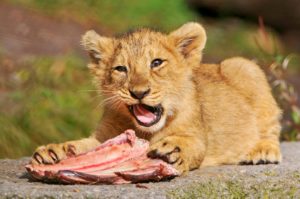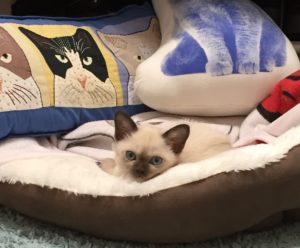What Is The Best Diet For Kittens?
Which kitten food is best?
I got a message this week from a friend who is about to adopt a new kitten, and she asked me what kind of food I recommend. It made me realize that there’s a lot of confusion out there about the best diet for kittens. With so many pet food manufacturers and veterinarians peddling “kitten food” and “kitten formulas” it can be challenging to decipher what your kitten truly needs.
Most dieticians recommend that we shop the perimeter of the grocery store and avoid the interior aisles. Why? Because the exterior areas are where you’ll find fresh, whole foods, and the interior aisles are full of processed food. Diet has a profound impact on health in humans and cats, perhaps more than we realize. When it comes to cats you must look at their biology: they are carnivores. From their teeth, to their jaw, to their digestive track, all these features are designed for a carnivore’s diet. Where do you find the best food for a carnivore–in the processed food aisle or the meat department?
Let’s be realistic…do kittens need a special formula?
 Cats who live in the wild don’t have grocery stores, and no one has ever told them to give their kittens a special diet or special food. They don’t saunter into the pet food store and ask for the best bag of kibble either. Common sense tells us this but our brains get checked at the door when we shop for cat food. Pet food companies who manufacture special kitten formulas know how brainwashed we are and bank on it. I look back and realize I was brainwashed, too!
Cats who live in the wild don’t have grocery stores, and no one has ever told them to give their kittens a special diet or special food. They don’t saunter into the pet food store and ask for the best bag of kibble either. Common sense tells us this but our brains get checked at the door when we shop for cat food. Pet food companies who manufacture special kitten formulas know how brainwashed we are and bank on it. I look back and realize I was brainwashed, too!
Whether it’s dry food or canned food it usually has a large amount of carbohydrates which cats are not able to digest. Carbs promote inflammation and lead to diseases like diabetes, IBD and cancer. But perhaps the most surprising fact about kitten formulas is the list of ingredients and guaranteed analysis. I took a look at a popular brand of cat food to examine their labels, and this was shocking: they were almost exactly the same! Take a look:
BLUE Basics®Free Indoor Turkey & Potato Entrée
For Adult Cats (canned food)
Turkey, Turkey Broth, Turkey Liver, Potatoes, Natural Flavor, Carrots, Peas, Fish Oil (source of Omega 3 Fatty Acids), Carrageenan, Cassia Gum, Flaxseed (source of Omega 3 and 6 Fatty Acids), Cellulose Powder, Cranberries, Blueberries, Pumpkin, Guar Gum, Potassium Chloride, Taurine, Salt, Choline Chloride, Sunflower Oil (source of Omega 6 Fatty Acids), Iron Amino Acid Chelate, Zinc Amino Acid Chelate, Vitamin E Supplement, L-Ascorbyl-2-Polyphosphate (source of Vitamin C), Thiamine Mononitrate (Vitamin B1), Copper Amino Acid Chelate, Manganese Amino Acid Chelate, Sodium Selenite, Niacin Supplement (Vitamin B3), Calcium Pantothenate (Vitamin B5), Pyridoxine Hydrochloride (Vitamin B6), Riboflavin Supplement (Vitamin B2), Vitamin A Supplement, Biotin (Vitamin B7), Potassium Iodide, Vitamin D3 Supplement, Vitamin B12 Supplement, Folic Acid (Vitamin B9).
Crude Protein 8.0% min
Crude Fat 6.0% min
Crude Fiber 1.5% max
Moisture 78.0% max
Taurine 0.10% min
Vitamin E 50 IU/kg min
Ascorbic Acid (Vitamin C)* 20 mg/kg min
Omega 6 Fatty Acids* 0.75% min
Omega 3 Fatty Acids* 0.15% min
Not on the label: Carbohydrate 6.5%
BLUE Basics®Grain-Free Indoor Turkey & Potato Entrée For Kittens (canned food)
Turkey, Turkey Broth, Turkey Liver, Fish Oil (source of DHA-Docosahexaenoic Acid), Natural Flavor, Carrots, Potatoes, Peas, Flaxseed (source of Omega 3 and 6 Fatty Acids), Cellulose Powder, Cranberries, Blueberries, Pumpkin, Carrageenan, Guar Gum, Cassia Gum, Potassium Chloride, Sunflower Oil (source of Omega 6 Fatty Acids), Taurine, Salt, Choline Chloride, Iron Amino Acid Chelate, Zinc Amino Acid Chelate, Vitamin E Supplement, L-Ascorbyl-2-Polyphosphate (source of Vitamin C), Thiamine Mononitrate (Vitamin B1), Copper Amino Acid Chelate, Manganese Amino Acid Chelate, Sodium Selenite, Niacin Supplement (Vitamin B3), Calcium Pantothenate (Vitamin B5), Pyridoxine Hydrochloride (Vitamin B6), Riboflavin Supplement (Vitamin B2), Vitamin A Supplement, Biotin (Vitamin B7), Potassium Iodide, Vitamin D3 Supplement, Vitamin B12 Supplement, Folic Acid (Vitamin B9).
Crude Protein 9.0% min
Crude Fat 7.0% min
Crude Fiber 1.5% max
Moisture 78.0% max
Taurine 0.10% min
Vitamin E 50 IU/kg min
Ascorbic Acid (Vitamin C)* 20 mg/kg min
Omega 6 Fatty Acids* 0.75% min
Omega 3 Fatty Acids* 0.25% min
DHA* 0.05% min
Not on the label: Carbohydrate 4.5%
Essentially there’s a 1 % difference in crude protein, crude fat and a .05 % more fish oil between the adult formula and the kitten formula.
BLUE Wilderness® Chicken For Kittens (kibble)
Deboned Chicken, Chicken Meal, Pea Protein, Tapioca Starch, Menhaden Fish Meal (source of Omega 3 Fatty Acids), Chicken Fat (preserved with Mixed Tocopherols), Peas, Dried Egg, Pea Fiber, Natural Flavor, Fish Oil (source of DHA-Docosahexaenoic Acid and ARA-Arachidonic Acid), Flaxseed (source of Omega 6 Fatty Acids), Choline Chloride, Dehydrated Alfalfa Meal, DL-Methionine, Potassium Sulfate, Potatoes, Dried Chicory Root, Salt, Calcium Carbonate, Taurine, Caramel Color, Potassium Chloride, Sweet Potatoes, Carrots, preserved with Mixed Tocopherols, Ferrous Sulfate, Nicotinic Acid (Vitamin B3), Iron Amino Acid Chelate, Zinc Amino Acid Chelate, Zinc Sulfate, Vitamin E Supplement, Cranberries, Blueberries, Barley Grass, Parsley, Yucca Schidigera Extract, Dried Kelp, Turmeric, Copper Sulfate, Thiamine Mononitrate (Vitamin B1), Copper Amino Acid Chelate, L-Ascorbyl-2-Polyphosphate (source of Vitamin C), L-Lysine, Biotin (Vitamin B7), Vitamin A Supplement, Manganese Sulfate, Oil of Rosemary, Manganese Amino Acid Chelate, Pyridoxine Hydrochloride (Vitamin B6), Calcium Pantothenate (Vitamin B5), Riboflavin (Vitamin B2), Vitamin D3 Supplement, Vitamin B12 Supplement, Folic Acid (Vitamin B9), Dried Yeast, Dried Enterococcus faecium fermentation product, Dried Lactobacillus acidophilus fermentation product, Dried Aspergillus niger fermentation extract, Dried Trichoderma longibrachiatum fermentation extract, Dried Bacillus subtilis fermentation extract, Calcium Iodate, Sodium Selenite.
Crude Protein 40.0% min
Crude Fat 20.0% min
Crude Fiber 3.5% max
Moisture 10.0% max
Magnesium 0.14% max
Calcium 1.5% min
Phosphorus 1.2% min
Taurine 0.2% min
Choline 3,500 mg/kg min
ARA 0.06% min
DHA 0.2% min
Omega 3 Fatty Acids* 1.0% min
Omega 6 Fatty Acids* 3.5% minNot on the label: Carbohydrate 26.5 %
BLUE Wilderness® Chicken For Adult Cats (kibble)
Deboned Chicken, Chicken Meal, Pea Protein, Tapioca Starch, Menhaden Fish Meal (source of Omega 3 Fatty Acids), Chicken Fat (preserved with Mixed Tocopherols), Dried Egg, Peas, Pea Fiber, Natural Flavor, Flaxseed (source of Omega 6 Fatty Acids), Choline Chloride, DL-Methionine, Dehydrated Alfalfa Meal, Potassium Sulfate, Potassium Chloride, Potatoes, Dried Chicory Root, Calcium Carbonate, Taurine, Caramel Color, Salt, Sweet Potatoes, Carrots, preserved with Mixed Tocopherols, Dicalcium Phosphate, Ferrous Sulfate, Nicotinic Acid (Vitamin B3), Iron Amino Acid Chelate, Zinc Amino Acid Chelate, Zinc Sulfate, Vitamin E Supplement, Cranberries, Blueberries, Barley Grass, Parsley, Yucca Schidigera Extract, Dried Kelp, Turmeric, Copper Sulfate, Thiamine Mononitrate (Vitamin B1), Copper Amino Acid Chelate, L-Ascorbyl-2-Polyphosphate (source of Vitamin C), L-Carnitine, L-Lysine, Biotin (Vitamin B7), Oil of Rosemary, Vitamin A Supplement, Manganese Sulfate, Manganese Amino Acid Chelate, Pyridoxine Hydrochloride (Vitamin B6), Calcium Pantothenate (Vitamin B5), Riboflavin (Vitamin B2), Vitamin D3 Supplement, Vitamin B12 Supplement, Folic Acid (Vitamin B9), Dried Yeast, Dried Enterococcus faecium fermentation product, Dried Lactobacillus acidophilus fermentation product, Dried Aspergillus niger fermentation extract, Dried Trichoderma longibrachiatum fermentation extract, Dried Bacillus subtilis fermentation extract, Calcium Iodate, Sodium Selenite.
Crude Protein 40.0% min
Crude Fat 18.0% min
Crude Fiber 4.0% max
Moisture 10.0% max
Magnesium 0.14% max
Taurine 0.15% min
Omega 3 Fatty Acids* 0.5% min
Omega 6 Fatty Acids* 3.5% minNot on the label: Carbohydrate 28%
The kitten formula has 2% more fat, .5% more fiber, added calcium, phosphorus, choline (for fat metabolism), .05% more taurine and .76% more fish oil than the adult formula.
At the end of the day when you compare commercial kitten vs adult formulas it’s easy to see there’s simply not much difference at all. Labelling is all about marketing to the consumer.
Ideal diet for kittens

Aylen at 12 weeks of age
Dr. Karen Becker, DVM, is passionate about proper diets: “To provide your new kitten with the very best start in life, feed her either a homemade or commercially available nutritionally balanced fresh food diet (preferably raw) designed for cats at all life stages. If you go the homemade route, you must absolutely insure the diet is nutritionally balanced. It doesn’t matter whose recipe you follow, but it does matter that it’s balanced.” The next best thing would be human grade canned food that has less than 6% carbohydrate in it. As they get older kittens can start to eat small raw bones (under supervision of course) which are great for cleaning their teeth and providing live enzymes, vitamins and minerals. Try offering fresh raw quail, Cornish game hen, and chicken necks cut into appropriate size pieces. I purchases these products at the grocery store or through a pet store that specializes in raw food for pets.
Most kittens start eating wet food around 4 weeks of age and are usually weaned by 8 weeks. Sometimes it’s much easier to convert kittens and younger cats than older cats who are set in their ways. When we got Aylen at 11 weeks of age I started her immediately on a fresh, raw diet, and she took to it immediately. Rocket and Gunner were around 7 years old when we started introducing raw food, and they didn’t need much convincing. They loved it! My two older cats, Lili and Hershey, are a bit pickier and prefer a mix of raw, freeze-dried and canned. Kittens definitely need more meals per day than adult cats because they’re growing and much more active. I recommend 3-4 small meals per day for about the first year or so, and usually 1.5 oz per meal is plenty. Be sure to rotate proteins in order to add variety and reduce the chance of developing food sensitivities.
Next time you’re shopping for kitten food skip the brands with Kitten Formula on the package and opt instead for a highly nutritious, species appropriate balanced diet. Your carnivore will thank you!
To learn more about reading pet food labels check out this page, and go here to learn more about feline nutrition.


